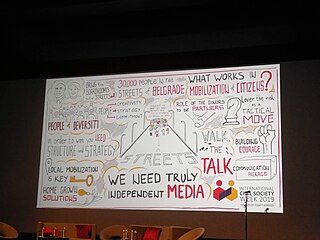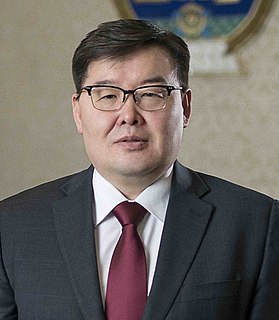Public choice, or public choice theory, is "the use of economic tools to deal with traditional problems of political science". Its content includes the study of political behavior. In political science, it is the subset of positive political theory that studies self-interested agents and their interactions, which can be represented in a number of ways – using standard constrained utility maximization, game theory, or decision theory. It is the origin and intellectual foundation of contemporary work in political economy.

James McGill Buchanan Jr. was an American economist known for his work on public choice theory, for which he received the Nobel Memorial Prize in Economic Sciences in 1986. Buchanan's work initiated research on how politicians' and bureaucrats' self-interest, utility maximization, and other non-wealth-maximizing considerations affect their decision-making. He was a member of the Board of Advisors of The Independent Institute as well as of the Institute of Economic Affairs, a member of the Mont Pelerin Society, a Distinguished Senior Fellow of the Cato Institute, and professor at George Mason University.
Judicial independence is the concept that the judiciary should be independent from the other branches of government. That is, courts should not be subject to improper influence from the other branches of government or from private or partisan interests. Judicial independence is important to the idea of separation of powers.

The Government of the Hong Kong Special Administrative Region, commonly known as the Hong Kong Government or HKSAR Government, refers to the executive authorities of Hong Kong SAR. It was formed on 1 July 1997 in accordance with the Sino-British Joint Declaration of 1983, an international treaty lodged at the United Nations. This government replaced the former British Hong Kong Government (1842–1997). The Chief Executive also nominates principal officials for appointment by the State Council of the People's Republic of China. The Government Secretariat is headed by the Chief Secretary of Hong Kong, who is the most senior principal official of the Government. The Chief Secretary and the other secretaries jointly oversee the administration of the SAR, give advice to the Chief Executive as members of the Executive Council, and are accountable for their actions and policies to the Chief Executive and the Legislative Council.

Civil society can be understood as the "third sector" of society, distinct from government and business, and including the family and the private sphere. By other authors, civil society is used in the sense of 1) the aggregate of non-governmental organizations and institutions that manifest interests and will of citizens or 2) individuals and organizations in a society which are independent of the government.
A budget process refers to the process by which governments create and approve a budget, which is as follows:

The Government of India, also known as the Central or Union Government or simply the Centre, is the union government created by the Constitution of India as the legislative, executive and judicial authority to govern the union of twenty eight states and eight union territories. The seat of the government is located in New Delhi, Delhi.
Law reform or legal reform is the process of examining existing laws, and advocating and implementing change in a legal system, usually with the aim of enhancing justice or efficiency.
Rechtsstaat is a doctrine in continental European legal thinking, originating in Dutch and German jurisprudence. It can be translated into English as "rule of law", alternatively "legal state", "state of law", "state of justice", or "state based on justice and integrity".

The Department of Budget and Management is an executive body under the Office of the President of the Philippines. It is responsible for the sound and efficient use of government resources for national development and also as an instrument for the meeting of national socio-economic and political development goals.
Constitutional theory is an area of constitutional law that focuses on the underpinnings of constitutional government. It overlaps with legal theory, constitutionalism, philosophy of law and democratic theory. It is not limited by country or jurisdiction.
The Virginia School of political economy is a school of economic thought originating in universities of Virginia in the 1950s and 1960s, mainly focusing on public choice theory, constitutional economics, and law and economics.

Robert D. Tollison was an American economist who specialized in public choice theory.
The government of Russia exercises executive power in the Russian Federation. The members of the government are the prime minister, the deputy prime ministers, and the federal ministers. It has its legal basis in the Constitution of the Russian Federation and the federal constitutional law "On the Government of the Russian Federation". The Apparatus of the Government of Russia is a governmental body which administrates the activities of the government.
Bernard H. Siegan was a longtime law professor at the University of San Diego School of Law, libertarian legal theorist and a former federal judicial nominee to the United States Court of Appeals for the Ninth Circuit. The New York Times called Siegan's nomination "one of the most bitterly disputed judicial nominations of the Reagan Era."

The rule of law is the political philosophy that all citizens and institutions within a country, state, or community are accountable to the same laws. The rule of law is defined in the Encyclopedia Britannica as "the mechanism, process, institution, practice, or norm that supports the equality of all citizens before the law, secures a nonarbitrary form of government, and more generally prevents the arbitrary use of power." The term rule of law is closely related to constitutionalism as well as Rechtsstaat and refers to a political situation, not to any specific legal rule.
Constitutional economics is a research program in economics and constitutionalism that has been described as explaining the choice "of alternative sets of legal-institutional-constitutional rules that constrain the choices and activities of economic and political agents". This extends beyond the definition of "the economic analysis of constitutional law" and is distinct from explaining the choices of economic and political agents within those rules, a subject of orthodox economics. Instead, constitutional economics takes into account the impacts of political economic decisions as opposed to limiting its analysis to economic relationships as functions of the dynamics of distribution of marketable goods and services.
The rule according to a higher law is a statement which expresses that no law may be enforced by the government unless it conforms with certain universal principles of fairness, morality, and justice. Thus, the rule according to a higher law may serve as a practical legal criterion to qualify the instances of political or economical decision-making, when a government, even though acting in conformity with clearly defined and properly enacted legal rules, still produces results which many observers find unfair or unjust.

Gombojav Zandanshatar or Zandanshatar Gombojav is a prominent Mongolian politician. He is a member of the Mongolian People's Party, and has served as Party General Secretary in 2012-2013.
The benefit principle is a concept in the theory of taxation from public finance. It bases taxes to pay for public-goods expenditures on a politically-revealed willingness to pay for benefits received. The principle is sometimes likened to the function of prices in allocating private goods. In its use for assessing the efficiency of taxes and appraising fiscal policy, the benefit approach was initially developed by Knut Wicksell (1896) and Erik Lindahl (1919), two economists of the Stockholm School. Wicksell's near-unanimity formulation of the principle was premised on a just income distribution. The approach was extended in the work of Paul Samuelson, Richard Musgrave, and others. It has also been applied to such subjects as tax progressivity, corporation taxes, and taxes on property or wealth. The unanimity-rule aspect of Wicksell's approach in linking taxes and expenditures is cited as a point of departure for the study of constitutional economics in the work of James Buchanan.







